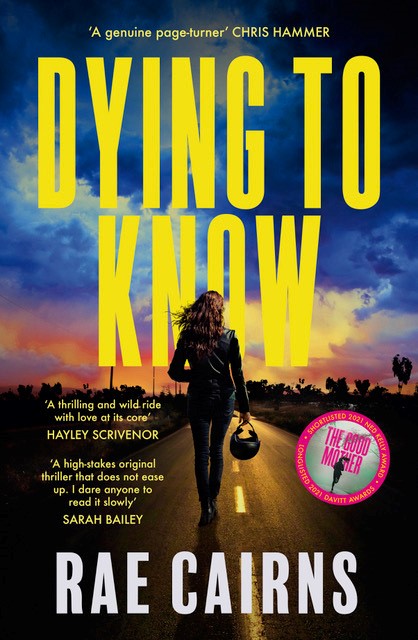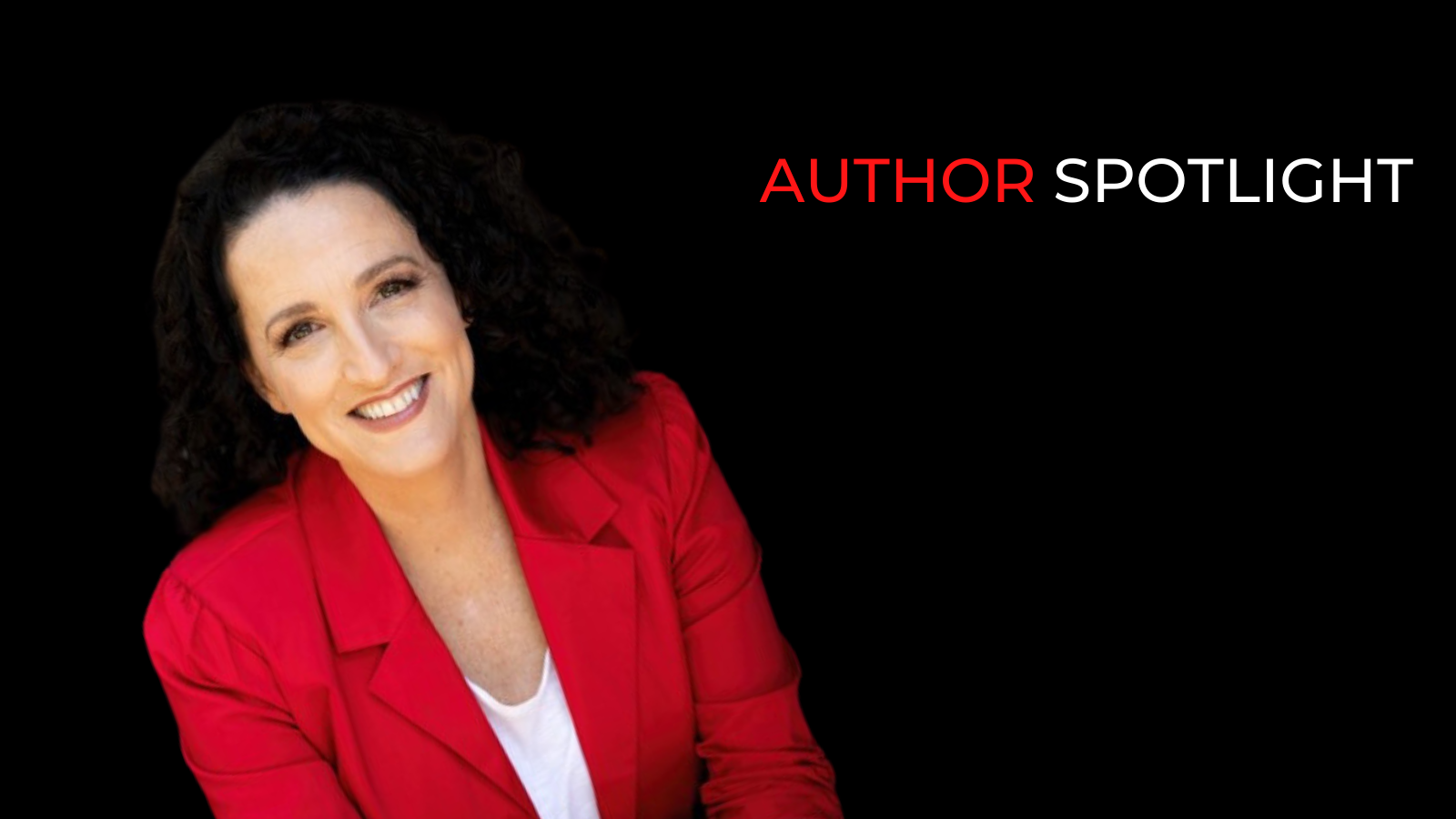Rae Cairns writes addictive thrillers about everyday people caught up in extraordinary events. Her first book, The Good Mother, drew on her experiences as a youth worker in Ireland at the end of the Troubles. It was shortlisted for the Ned Kelly Awards and longlisted in Sisters in Crime Davitt Awards.
Rae’s latest book, Dying to Know, kicks off explosively. Budding journalist Geneva Leighton receives a phone call from her terrified sister, who’s been abducted and is locked in the boot of a car. Where is she, and who took her? Twelve years later, Geneva is still looking for answers and when they come, they’re more dangerous than she could imagine. Natalie Conyer put Rae through her paces for Author Spotlight.
Both your novels, Rae, centre on vulnerable yet tough women who are alone but at the same time have responsibilities to children. Where does this theme come from, and why is it important to you?
Part of the reason I write, alongside an absolute love of storytelling, is to try to understand why people do what they do. I’m particularly intrigued by the complexity of relationships, especially within family units, and the power of the need to belong.
I put my protagonist in parental roles because it ramps up what and who is at stake and also provides me with an opportunity to challenge some stereotypes about women, particularly around motherhood, parenting and perceived female fragility. The women in my life are strong and central to all generations of their family, but they, and others, so often question their instincts and value. I think that’s part of what drives me to want to explore the idea of a female ‘hero’.
Isolation is a part of my protagonist’s character arc. It allows me to examine who she is at her heart. I drop her into the worst time of her life and take away many of her support systems so she must draw on every inner resource she has to protect those she loves and to survive.
Much of Dying to Know involves motorbikes and bikie gangs, and your depictions of both ring absolutely true. Where did this knowledge come from? What research did you have to do for this novel?
When my husband bought a motorbike a few years ago we started going on rides together, with me as a passenger on the back. During rest stops I discovered a whole subculture that exists around motorbikes. It’s a scene that involves people from all walks of life, from weekend riders like us right through to the members of the outlaw bikie motorcycle clubs (MCs). I became intrigued and decided to incorporate it into Dying to Know.
I read biographies about bikie culture, written by police detectives and gang members.
Then I dragged my very understanding husband to as many renowned motorbike pubs, cafes and specialist shops as I could, and struck up conversations with anyone who would give me the time of day.
I hit gold when the opportunity arose to chat with an ex-Rebels bikie gang member. He led me through his experiences and opinions on numerous subjects including the day-to-day life of an outlaw biker, the NSW police, the impact of Strike Force Raptor on him personally, the role of women in his motorcycle club, the emerging gangs and new world order of MCs, and so much more.
I balanced this information by shadowing a police officer at a Police Citizens Youth Club (PCYC) in Sydney’s west and asking him his thoughts on many of the same topics. Both were extraordinarily generous, and listening to their thoughts, word choice, and speech patterns helped me to thread so much more colour into the novel.
In both your novels you lead the reader through twisty, suspenseful plots. How do you craft your novels? Are you a plotter or a pantser?
I am a pantser, although I do decide on certain elements before I start writing.
I begin with an idea. The spark for Dying to Know came from listening to a young woman discuss the impact of her brother going missing and how it upended every aspect of her family’s world. I became fixated on writing a crime novel centred on those left behind when a loved one disappears. A short while later I was driving and pulled up behind a Camry with an old-style boot. My overactive imagination kicked into gear – what if someone was in the boot of that car? This gave me the opening scene of my novel.

Next, I settle on the major theme of the novel. For Dying to Know it was the power of belonging. I wanted to examine what actions people would take to maintain belonging in a family, or amongst their peers at work, as well as why people would join organisations like outlaw motorcycle gangs.
Following the theme, I set a moral question to underpin the novel. For Dying to Know the question was ‘Is uncovering the truth always worth the price you and your loved ones might pay?’
Then I research, allowing myself to burrow down lots of rabbit holes.
Once I have my story idea, moral question, theme, and research I start at page one and write the scenes in chronological order. I love that process of discovering the plot.
You’ve spoken about living with rheumatoid arthritis. How has this affected your writing, and do you have any advice for people trying to write while battling chronic health problems?
Five years ago, during the period my agent was pitching The Good Mother to publishers, I was diagnosed with the autoimmune disease Rheumatoid Arthritis. It causes joint inflammation and pain in many of my joints, gives me brain fog, and also affects my eyes.
Living with a chronic illness is a matter of managing the symptoms, fatigue, and flares. I do get impatient with my body and become especially frustrated when the illness messes with my ability to write, but I’ve gradually learned to accept my limitations and admit to those around me that I’m struggling, including my very understanding publisher.
I’ve also found workarounds to deal with the challenges of the disease. My first draft, once handwritten, is now created using speech-to-text software. It took me three months of practice to rewire my brain to the format, but it has sped up my first draft process.
What are you working on now? Can you give us a preview of what to expect next?
I’m writing another standalone crime thriller set in Sydney and it’s a little like the movie The Fugitive but with a female hero.
You can find out more about Rae Cairns here.
